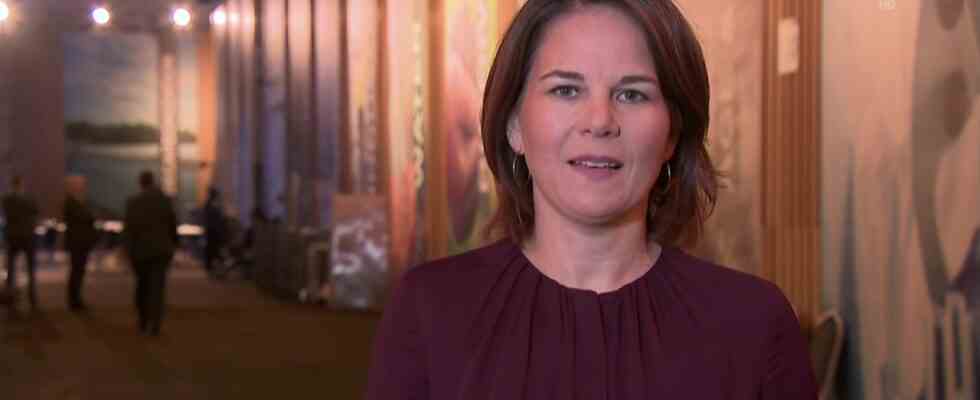Status: 11/18/2022 9:50 p.m
The climate conference has already been extended, but breakthroughs are yet to come. Foreign Minister Baerbock sees the problems in daily topics-Interview further on reducing emissions and financing climate damage.
From the point of view of Foreign Minister Annalena Baerbock, there is still no breakthrough on central issues at the COP27 climate conference. It’s still “on the two crucial points,” said Baerbock in an interview with the daily topics.
Annalena Baerbock, Federal Foreign Minister, where are the negotiations at the world climate conference stalling?
daily topics 10:15 p.m., 18.11.2022
How does the world intend to halve its emissions?
On the one hand, it is about a work program on how the world can halve its greenhouse gas emissions in the coming years. From a European point of view, this means that all industrialized countries report annually on how they are progressing with their climate targets in the individual sectors – transport, buildings, energy – as is already done in the EU.
“But unfortunately this is being blocked, interestingly enough by the countries that are not mostly affected themselves [von einer Berichtspflicht, Anm. d. Red.]”, said Baerbock. “Perhaps also out of concern that they themselves would have to significantly reduce their emissions in the future.”
Financing of climate damage remains controversial
The second point of contention is the financing of climate damage in poor countries. This particularly affects island states and very poor African countries, said Baerbock. They could no longer cope with the effects of the climate crisis, for example because entire villages would have to be resettled and the countries lacked the resources for this. “They rightly say: ‘We need money for this’. That’s the so-called money for damages and losses.” The EU has already made proposals to better support these countries.
“And here, too, it is unfortunately blocked by other states that also have large emissions,” said Baerbock. Counter-proposals have also been submitted by the group of the so-called G77 countries – countries that see themselves as developing and emerging countries. “But behind it all are the emitters, including China, which already have large emissions today,” said Baerbock. But China is no longer a developing country.
There are various proposals for financing climate damage, including those from the USA, which propose a different procedure than the Europeans. “But to put it briefly, it’s about how we can mobilize so much money together that we can really help with a view to the effects of the climate crisis where people’s survival is, in the truest sense of the word, a matter of survival.”
Is the coal phase-out shaking?
Baerbock also sees problems with the exit from coal. Because at the climate conference in Glasgow last year, it was agreed to phase out coal in order to still have a chance of meeting the 1.5 target. “Some don’t want that to be so clear in the text now,” said Baerbock. “That would be a step backwards, in my view a fatal step backwards.” Therefore, the goal remains that the COP27 final document should state that coal will be phased out worldwide.

